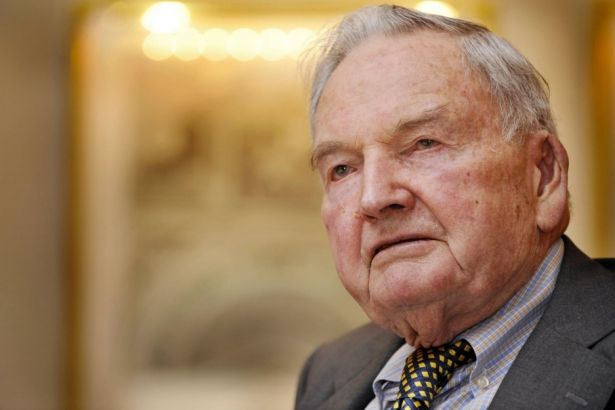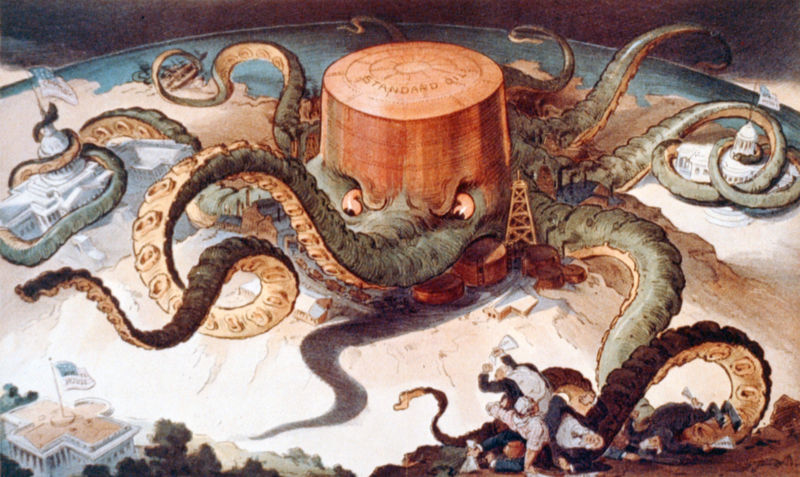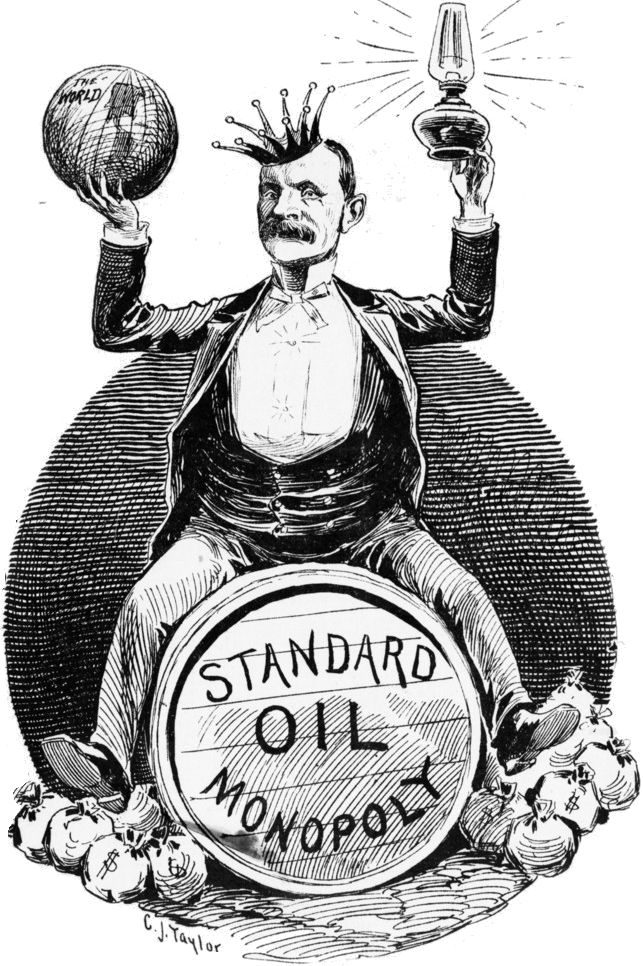Rockefeller: A dynasty that exploited the world

The Rockefellers have never been an ordinary rich family. As indicated in many resources, Rockefellers is a family that can be considered as the royal family of the US. It is not surprising, therefore, to hear that Rockefeller family is a “dynasty”.
The Rockefeller Dynasty has always been a family that has left the considerable impact on the world’s political history and never hold themselves back from going into politics directly. Especially from the beginning of the 20th century, the Rockefellers has done their worst to enhance the international power of the US and to place the US into a significant position within the world capitalist system that had slowly been emptied by the British Empire.
And they did this not through various conspiracies or some secret affairs, as thought by many, but through their “philanthropist” organisations and by remaining faithful to their once unprecedented wealth and to a long-term game plan.
THE ROCKEFELLER DYNASTY IN LENIN’S “IMPERIALISM” PAMPHLET
When the term imperialism is mentioned, one of the works that come to one’s mind is surely Lenin’s pamphlet, Imperialism – The Highest Stage of Capitalism. The Rockefellers, whose main field is oil, is mentioned several times in this pamphlet.
For Lenin, the increase in the capital of the Rockefeller Dynasty from the 19th to the 20th century and the way this increase was realised present a clear example for the term “concentration of capital”:
Among the few banks which remain at the head of all capitalist economy as a result of the process of concentration, there is naturally to be observed an increasingly marked tendency towards monopolist agreements, towards a bank trust. In America, not nine, but two very big banks, those of the billionaires Rockefeller and Morgan, control a capital of 11 billion marks.
Lenin refers to the Rockefellers example, once again, to discuss how industrial capital and financial capital were integrated. He cites the following passage from Otto Jiedels’ study on the relationship between the giant banks of Germany and industry, one of Engels’ main sources for his pamphlet:
The world oil market is even today still divided between two great financial groups — Rockefeller’s American Standard Oil Co., and Rothschild and Nobel, the controlling interests of the Russian oilfields in Baku. The two groups are closely connected.
When the subject turns to the competition on market shares and resources, the Rockefeller Dynasty again constitutes one of the examples Lenin gives:
On the one hand, the Rockefeller “oil trust”, wanted to lay its hands on everything, it formed a “daughter company” right in Holland, and bought up oilfields in 78 Imperialism, the Highest Stage of Capitalism the Dutch Indies, in order to strike at its principal enemy, the Anglo-Dutch Shell trust. On the other hand, the Deutsche Bank and the other German banks aimed at “retaining” Romania “for themselves” and at uniting her with Russia against Rockefeller. The latter possessed far more capital and an excellent system of oil transportation and distribution.

Briefly, it is not a coincidence that the saying “good for ‘Standard’, good for America” has been well-known. The most important symbol of the US imperialism was once Rockefellers’ company, Standard. It is for this reason that other studies on imperialism also analyse the Standard Oil Monopoly created by the Rockefeller family.

The Rockefeller Family has always had a big impact on the US foreign policy by means of their power in the think-tank called Council on Foreign Relations (CFR), on which many half-true myths have been written because of the capital and surplus they own. One of the instruments that deepened this impact of the Rockefellers and made this impact permanent is the “charities” like the Rockefeller Foundation, which became an integral part of the US foreign policy.
THE ROCKEFELLERS, SOCIAL SCIENCES AND TURKEY
Rockefellers’ relationship with religion and charity constitutes a complicated and special position within their “official” biography. It is not possible for us to know how much the family believes in “going to heaven by doing good or being purified from the sins of trade”, but we can certainly say this:
It is clear that the Rockefellers is a class-conscious capitalist family who tries to ensure, as an investment strategy, that the US, with the “charities”, dominates the world ideologically and morally as well as economically and who does not abstain from spending millions of dollars on this strategy.
The most well-known among these charities is certainly the Rockefeller Foundation. The foundation, especially with its financial grants for scientific studies and fellowships for scientists, has played a critical role in characterising the “world of thought” and constructing an academic setting led by the US.
A stunning example is the reconstruction of the social sciences in France after the World War 2 under the leadership of the US. Kristin Ross shows this clearly by giving satisfactory examples in her work titled as Fast Cars, Clean Bodies, in which she argues that “a special Marshall Plan was in effect for intellectuals”. The US was trying to encourage “new age” social sciences through the Rockefeller Foundation and similar organisations and to make Marxism suffocate within the intellectual field by isolating it in Europe and promoting this new age version. France was a laboratory for this attempt:
The French social sciences we are familiar with now were thus a postwar invention, and like all aspects of French modernization after the war their ascendency bore some relation to US economic intervention. (…) A review of the literature makes a convincing case that the foremost American export of the period was not Coca-Cola or movies but the supremacy of the social sciences. In October 1946, the director of the social science division of the Rockefeller Foundation proclaimed, “A new France, a new society is rising up from the ruins of the Occupation. (…) In France, the issue of the conflict or the adaptation between communism and western democracy appears in its most acute form. France is its battlefield or laboratory”.
Ross points out the financial support provided especially for structuralism and history/social science school known as the Annales school, and also the leading role the Rockefellers played in spreading this throughout the world under the leadership of the US.
Turkey, which chose to place itself within the anti-communist, so-called “Free World” after the World War 2, which put the object of being “the little US” in front of itself as being a part of the Marshall plan and which became a part of the NATO in 1952 as a border post for the imperialists against the Soviets, started to catch Rockefeller’s interest especially in the 1950s. It is beyond coincidence that the Democrat Party [in Turkey] came into power and the “humanitarian” actions of the US were on the rise in Turkey in these years. The relationship can be seen so clearly that in the 1950s the Turkish consulate in New York was in apartment 50 of the Rockefeller Center.
In the 1950s and 1960s, many leading historians (e.g. Halil İnalcık), economists (e.g. Nejat Bengül), psychologists (e.g. Muzaffer Şerif), physicists (e.g. Asım Orhan Barut), journalists (e.g. Bülent Ecevit), young scholars (e.g. Gülten Kazgan, Korkut Boratav, Deniz Baykal, Mete Tunçay), and artists (e.g. Ahmet Hamdi Tanpınar, Bilge Karasu, Duygu Sarıoğlu) benefited from Rockefeller’s scholarship and did scientific research in the US or in Europe. The following chart shows how the scholarships of the Rockefeller Foundation are broken down based on their field:

Source: Rose, Kenneth, “The Rockefeller Foundation’s Fellowship Program in Turkey, 1925-1983”. The Rockefeller Archive Center.
The Rockefeller scholarship intended to transform social sciences not directly but in the long run, to counteract Marxism in various fields as happened in France, to provide quick remedies for the socioeconomic and political problems created by the capitalist system. This does not mean, of course, those who went to the US with the help of the Rockefeller scholarship became a US agent directly or indirectly.
Some other scientific activities of the Rockefellers in Turkey can be put as follows:
Rockefeller Foundation provided financial support for publishing the 1950 version of the Redhouse English Dictionary with the title New Redhouse Dictionary (Yeni Redhouse Lûgatı in Turkish), which was published in the 1860s before.
Another issue is the foundation of American studies departments in Turkey, as examined in detail in the work of Cangül Örnek, [Turkish] Intellectual Life in the Cold War. Rockefeller Foundation made an enormous effort to establish American Culture and Literature Departments in Turkish universities, where there were none before 1950. These efforts brought the first result in Ankara University, Faculty of Language, History and Geography for the academic year 1953-54. American Studies in this faculty found itself as a department shortly. This was followed by İstanbul University, again with the support of the Rockefeller Foundation.
Rockefeller Foundation also had an active role in the transformation of Robert College [İstanbul] into Boğaziçi University, besides its regular donations to Robert College and Üsküdar American College.
During the 1950s and 1960s, Rockefellers had provided financial grants to various state institutions of health and education.
These kind of activities had a serious impact on shaping and consolidating the economic, political and cultural hegemony of the US. This process has been experienced similarly in Turkey, too.
Young researchers were bound to benefit from such a scholarship since Turkish government had no funds to allocate or to be able to allocate especially for social sciences. As a result, these people were restricted with the subjects and methods fixed by the restrictions of the scholarship.
However, this long term plan targeting the transformation of the world of thought had also short term impacts on some. Yalçın Küçük, in an interview, states that Deniz Baykal, who had an assistantship in Ankara University Law School and went to the US with the Rockefeller scholarship, started to use the term social stratum instead of class after coming back from the US.



